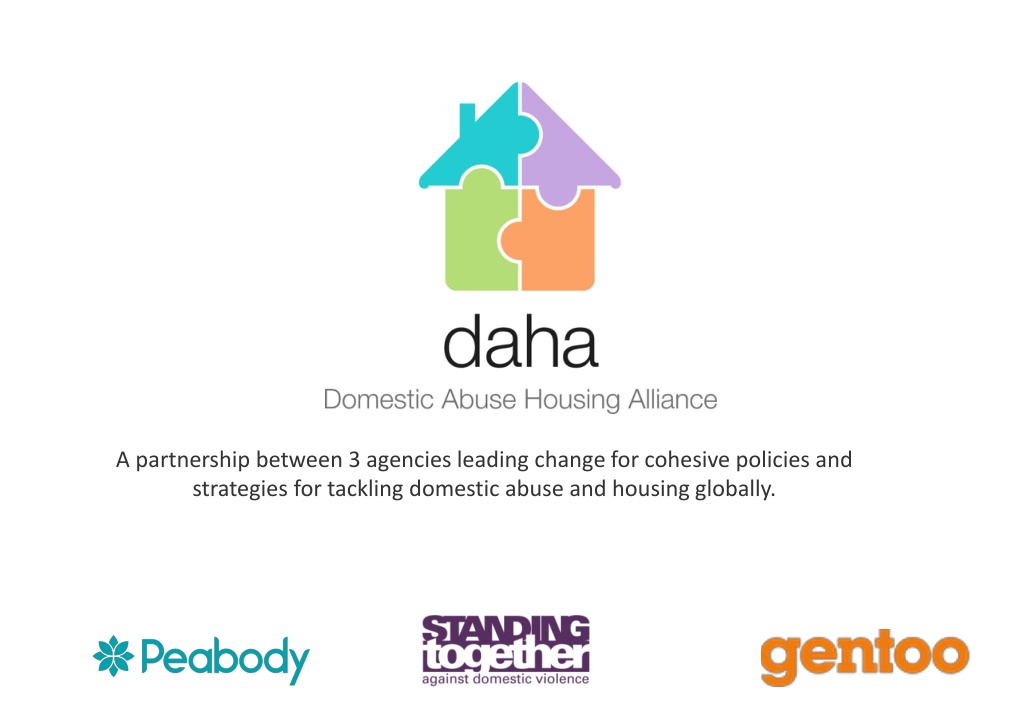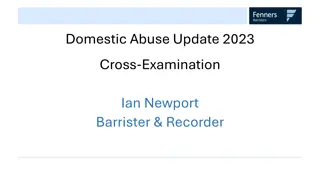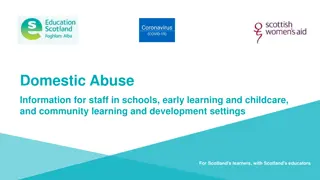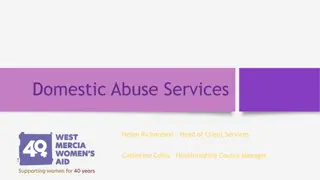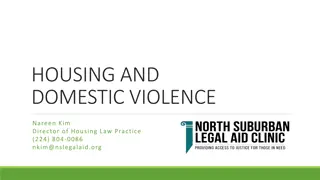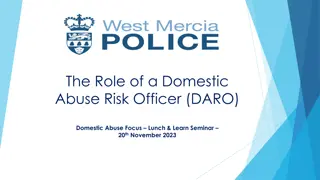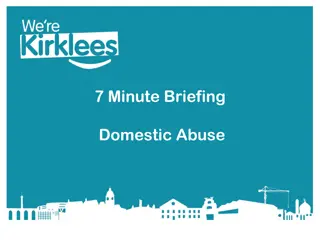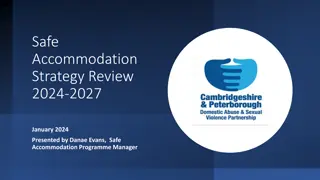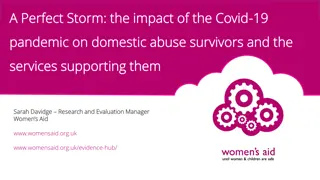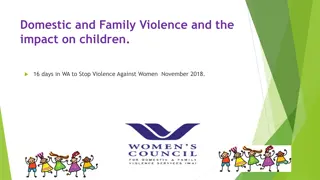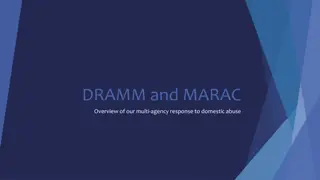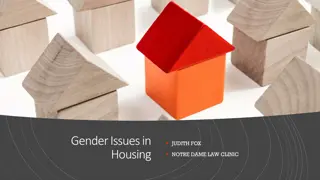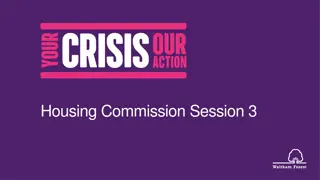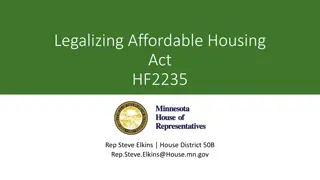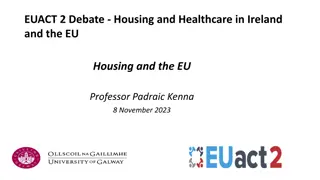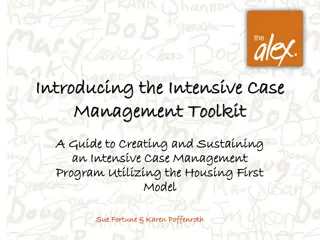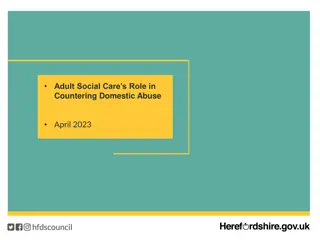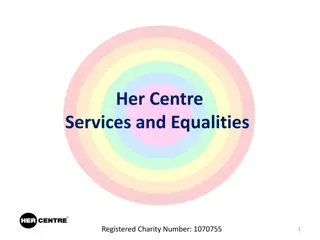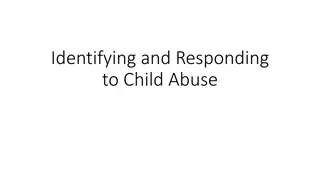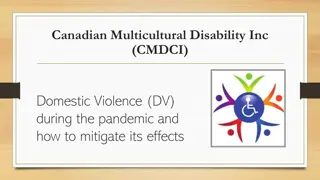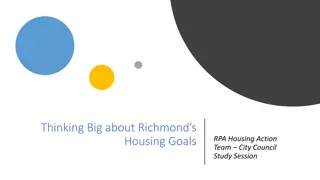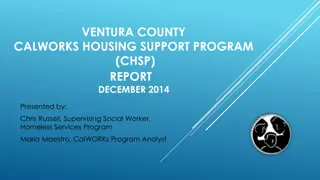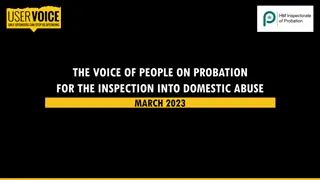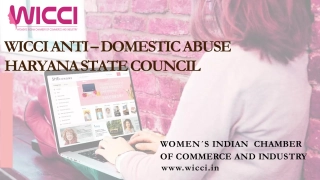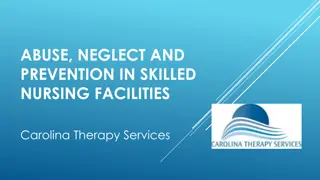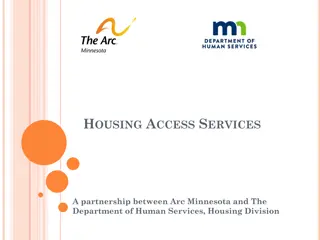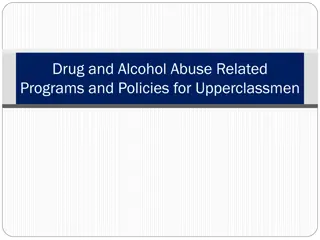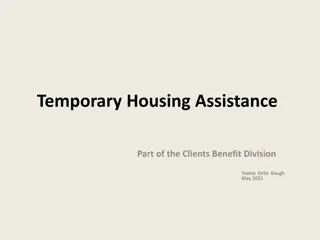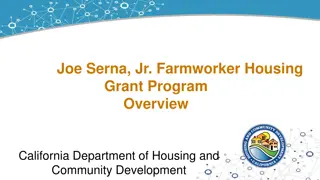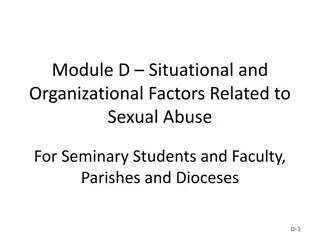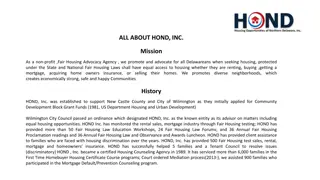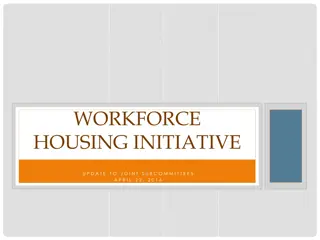Addressing Domestic Abuse and Housing Issues through Strategic Partnership
Collaborating with three agencies to address domestic abuse and housing challenges globally, this initiative focuses on influencing the housing sector, lobbying for policy changes, research dissemination, and evaluation to combat domestic violence. The partnership also aims to improve the national response to domestic abuse through innovative programs and workshops, backed by funding from various organizations.
Download Presentation

Please find below an Image/Link to download the presentation.
The content on the website is provided AS IS for your information and personal use only. It may not be sold, licensed, or shared on other websites without obtaining consent from the author. Download presentation by click this link. If you encounter any issues during the download, it is possible that the publisher has removed the file from their server.
E N D
Presentation Transcript
A partnership between 3 agencies leading change for cohesive policies and strategies for tackling domestic abuse and housing globally. Standing together against domestic violence
Who we are and what we do? Influence the Housing Sector and lobbying Government & other agencies to get domestic abuse (DA) on the housing agenda Research & dissemination of good practice Evaluation York University Development and dissemination of accreditation process for housing providers in order to improve national response to domestic abuse Online self assessment toolkit for housing providers National DAHA workshops covering the 8 priority areas in toolkit Employ 5 Housing Development Managers 1 new post in Cambridgeshire which is a pilot in rural area (Oct 17) 1 Private rented Sector post (Dec 17) We currently receive funding from London Councils, Comic Relief, Home Office, DCLG & Tampon Tax
Domestic Abuse The cross-government definition of domestic violence and abuse is: any incident or pattern of incidents of controlling, coercive, threatening behaviour, violence or abuse between those aged 16 or over who are, or have been, intimate partners or family members regardless of gender or sexuality. The abuse can encompass, but is not limited to: Psychological physical sexual financial emotional
Why are we still talking about domestic abuse? A woman typically endures 35 assaults before contacting the police or another agency. Each year 1.4 million women suffer some form of domestic abuse in England and Wales Each year 700,000 men suffer some form of domestic abuse in England and Wales 2 women a week in England and Wales are murdered as a result of male violence Domestic abuse is the largest cause of death worldwide in women 19-44 Worldwide 1 in 4 women have reported experiencing some form of physical or sexual violence from an intimate partner in their lifetime 1 in 4 people identifying as Lesbian, Gay, Bisexual or Transgender experience domestic abuse during their lifetime 62% of children living with DA are directly hurt by the perpetrator The police take a call about domestic abuse every 30 seconds
Housing & Domestic Abuse Domestic Abuse is the leading cause of WOMEN S HOMELESSNESS Residents living with Domestic Abuse are 4 TIMES more likely to have ASB complaints made against them Residents living with Domestic Abuse are 4 TIMES more likely to have a NOSP served Residents living with Domestic Abuse are more likely to be in SERIOUS FINANCIAL CRISIS
Cost & Impact on Housing Sector 1.6 billion in Emergency housing alone Residents experiencing DA 7 TIMES more likely to be in rent arrears 1k + Void properties where DA occurred 6 times more expensive to prepare to re-let High levels of turnover in empty properties Feelings of safety lower on roads where there is DA High levels of property damage in homes where there is DA
Benefits for Housing Sector Financial Reputational Less Evictions Increase customer satisfaction Tenancy Sustainment Seen as model of best practice, a leader and innovator in the housing sector s response to domestic abuse Improved efficiency via staff disclosures Increased staff confidence Quicker case resolution DAHA chartermark can be publicised on website and promotional material Avoiding ASB cases Residents able to access wider offers, eg employment Rent recovery Safeguarding tenants Noise nuisance reduction Positive impact on local and wider community Cases identified sooner leading to less property damage/professional input Effective partnership working and information sharing around DA enables referrals to specialist agencies to help you.
Why get Involved? Bring Housing to the Table: Housing is uniquely placed to identify, recognise & respond to domestic abuse Ensure staff & residents are aware and equipped to deal with DA Cost benefits to the organisation and society Save lives and improve an organisation s response to individuals experiencing domestic abuse
The Accreditation Process http://accreditation.dahalliance.org.uk/ FREE: Online self assessment Workshops (national) ACCREDITATION 3000 Valid for 3 years
8 Priority Areas Policy and Procedures Case Management Risk Management Equality and Diversity Perpetrator Management Partnership Working Staff Training Publicity and Awareness
Summary This fits with Cambridgeshire and Peterborough s vision: "by empowering all public facing staff to identify the risk of homelessness and work together to prevent it, we make homelessness the unacceptable outcome". Housing providers are ideally placed to spot the early signs of domestic abuse. A joint review by the Home Office and DCLG of domestic violence provision in 2015 highlighted the need to ensure that victims of domestic abuse get help earlier, before they reach a crisis, and that housing provision including refuges are a key element of this support. Research has demonstrated that early intervention is more effective and less expensive than crisis intervention in DA cases. Housing providers can play a vital role in safeguarding families affected by domestic abuse if given the right advice and training. There are substantial benefits to housing providers in getting it right when it comes to domestic abuse, both financial and reputational.
Next steps? Do you know how many cases of domestic abuse you have across your properties? Do you have a stand-alone Domestic Abuse policy? Do your staff know how to respond if they suspect a tenant may be a victim of domestic abuse? Do front-line staff know what to do if a case of domestic abuse is reported to them? Check out our FREE on-line toolkit: www.accreditation.dahalliance.org.uk Attend and publicise our FREE workshops Consider DAHA accreditation Contact us:
Sharon Crosby 07592 505083 s.crosby@standingtogether.org.uk Caroline Mackechnie-Jarvis 07592 505084 c.mackechniejarvis@standingtogether.org.uk www.dahalliance.org.uk #DAHousing www.accreditation.dahalliance.org.uk
